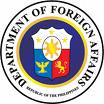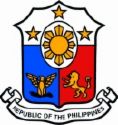
DEPARTMENT OF FOREIGN AFFAIRS
REGIONAL CONSULAR OFFICE - BACOLOD
3rd Level, Robinsons Place, Brgy. Mandalagan, Bacolod City

 |
Republic of the Philippines DEPARTMENT OF FOREIGN AFFAIRS REGIONAL CONSULAR OFFICE - BACOLOD 3rd Level, Robinsons Place, Brgy. Mandalagan, Bacolod City |
 |
| HOME | NEWS AND UPDATES | PASSPORT REQUIREMENTS | PASSPORT CERTIFICATION | DOWNLOADS |
| MOBILE PASSPORT SERVICE | AUTHENTICATION | PENDING APPLICATIONS |
Authentication FunctionThe Department of Foreign Affairs (DFA) performs its authentication function/services in the context of 1963 Vienna Convention on Consular Relations. Given the existence of a multi-state system, aforesaid Convention stipulates that, among other things, the various kind of documents sourced from particular sovereign states (e.g. public documents, private documents, and commercial documents) shall have validity or operative effect in another sovereign state's legal jurisdiction after subjected to an agreed upon authentication procedure. The DFA through the Authentication Division-Office of Consular Affairs may authenticate an act, deed documents etc. executed or sourced within Philippine legal jurisdiction by way of certifying said act, as follows: a) executed before a local notary public officer authorized to execute such functions, b) testified to by a public seal, c) rendered public by the authority of a competent magistrate, d) certified as being a copy of a public register. When these acts, deeds or documents have been duly authenticated by the Department, the receiving embassies or consulates or any other foreign legal entities are, in effect assured that aforesaid documents are in order or have been legalized in accordance with proper procedure. Foreign Embassies, Consulates and foreign legal entities may or may not require the authentication of documents sourced from the Philippines for use within their respective jurisdictions. However, under rules of reciprocity in international relations, sovereign states normally require authentication of foreign documents to be used. The DFA authentication attest to the genuineness of the signature appearing on the attached certification for the purpose of identifying a specific document and giving credence to the official acts of the notary public or certifying officer thereon for use, if and when required, as instrument of evidence in foreign countries. As such, the DFA certification/authentication does not, per se, authenticate the validity/efficacy/enforceability of the basic document itself. However, the Authentication Officer is impressed with duties calling for carefulness and faithfulness whereby he must inform himself of the facts to which he intends to certify and avoid participation in illegal enterprises. Authentication Procedures1. PUBLIC/OFFICIAL DOCUMENTS |
(in consecutive order) |
|
|
|
|
|
|
|
|
|
|
|
|
|
|
|
|
|
|
|
|
|
| 1. SCHOOL RECORDS | |
|
|
|
|
|
|
| 2. PERSONAL RECORDS | |
|
|
| 3. AFFIDAVITS | |
|
|
|
|
|
For Certificates of Origin issued by the Bureau of Customs:
|
|
|
Disposal of Unclaimed Documents after three(3) months from Date of Release. The Public is advised that, all unclaimed DFA Authentication Certificates will be disposed of three(3) months from the scheduled date of release. |
All applications should be made in person by the applicant except under certain circumstances (e.g. documents filed by his/her immediate kin. |
Any spurious , fake or tampered documents submitted for authentication are subject to outright seizure upon proper determination by the DFA Authentication Officer. holder of said documents, as well as fixers are liable to prosecution. |
| CONTACT US | ABOUT US | RELATED SITES | E-PASSPORT Q & A |
|
Tel no. (034) 441-2681, (034) 441-2675 Email: dfa_bacolod@yahoo.com; rcobacolod@gmail.com; bacolod.rco@dfa.gov.ph all rights reserved |